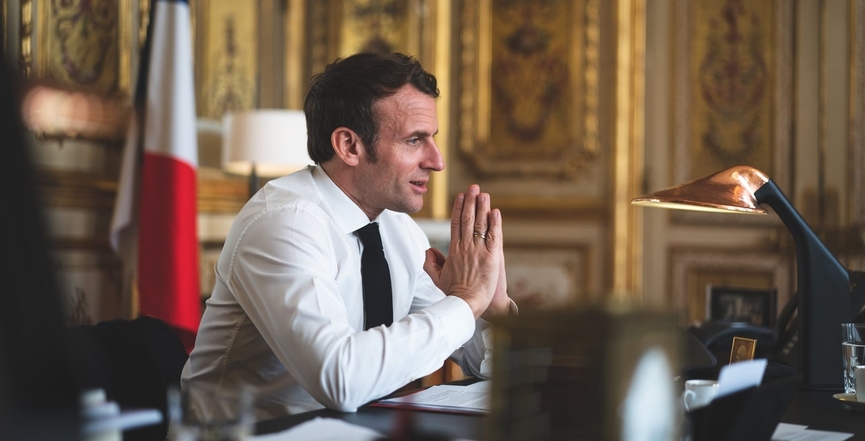During a first and symbolic visit to Algeria — a former French colony — in 2017, Emmanuel Macron was asked by a journalist about the crimes the French colonial regime committed in Algeria that included killing and raping the local population for more than a century.
The French president, looking annoyed, replied that he knows the “Histoire,” but that he is not a hostage of the past and argued “both of us [France and Algeria]” should be looking into the future.
A few days before, Macron tweeted an excerpt from an interview he had with an African journalist. In it, the French president gave the same patronizing advice to a young woman who asked him about the crimes against humanity committed by France in Africa.
Implying that she didn’t live through colonization because she was young, Macron reiterated his call for “neither denial nor repentance” and stressed that “we cannot remain trapped in the past.”
Taken at face value, those words seem to fit the attitude of a dynamic, pragmatic and young president who wanted to build new business relationships with the old French colonies. I would have understood this attitude, without necessarily agreeing with it, that in order to build new and better relationships, the past should be moved on from, but from both sides.
According to this distorted logic, France should embrace its French citizens originally from former colonies — without rejecting their religions, cultures and traditions — and on the other side, French citizens from the former colonies should embrace France, without holding grudges for their painful past.
However, this erasure of the past and “looking-towards-the-future” attitude seems to be very selective — mainly to the advantage of the French state, the former colonizer, serving its interests when needed, and dropped when not.
Only the colonized seem to be expected to forget their past. The colonizers have the luxury to bring it up or hide and erase it whenever they see fit. The “forgetting-the-past” approach is always on the French state’s terms, and never on the terms of its citizens originating from former colonies.
Indeed, this same past was brought up recently by Jean Castex, Macron’s prime minister, in order to appease the insecurities of the French political and intellectual class.
Speaking about the fight against Islamist terrorism, the French prime minister insisted that “the first way to win a war is for the national community to be united, or united, or proud. Proud of our roots, of our identity, of our Republic, of our freedom.”
So why can the past, with its crimes against humanity, become a source of inspiration for some politicians, whereas this same past should supposedly be forgotten by French Muslims?
France has a long history with “la problématique islamique.” It didn’t start with the recent trial of the 2015 Charlie Hebdo attack. It didn’t start with the debate about the “Islamic veil” that has been ongoing since the end of the 1980s — before being eclipsed by the more recent burkini ban controversy on French beaches.
With over five million Muslims, France is home to the largest Muslim population in Europe. And yet Muslims’ relationship to the French political class and media is extremely tense.
Every time there is a tragic event, committed or claimed by Muslim extremists on French soil (regardless of whether the perpetrator is of French descent or from a different country), the media and political machines start a cycle of blaming and targeting Muslim citizens with laws — like the planned “Islamist separatism” bills that Macron announced a few days before the recent horrifying beheading of school teacher Samuel Paty in Paris.
And each time, the debate is simplistically described as a fight between “good and evil,” where evil is always attributed to French Muslims with terms like “Islamism,” “Jihadism,” “terrorism,” “separatism” and “barbarism.” The “good,” meanwhile, is always attributed to French republican values described by words like “laïcité,” “civilité,” “liberté” and “égalité.”
Yet none of these ideals ever seem to be adopted to embrace French Muslims.
After Abdullakh Anzorov, a young Chechen refugee living in France, brutally murdered Paty — who had shown his students the Charlie Hebdo caricatures of the prophet Mohamed — voices in the media and political class were very quick to pinpoint an imaginary link between this appalling act of violence and Islam — and by extension, between terrorism and French Muslim communities.
The mental state of the killer was largely unquestioned. Only his religious affiliation seemed to matter. And, by association, so did the faith of French Muslims.
The government cracked down on more than 50 Muslim organizations, while vigilante groups attacked mosques. A French minister proposed a ban on the Collective Against Islamophobia in France (CCIF) — an association that tracks anti-Muslim hate crimes — prompting opposition from academics and civil society groups.
French republican values are anchored in a controversial past: a past where the powerful party is always the French state and the weak are those who were colonized — a past that Macron urges Algerians and Africans to forget, but one that the French state is eager to remember and be proud of when it suits them.
Monia Mazigh was born and raised in Tunisia and immigrated to Canada in 1991. Mazigh was catapulted onto the public stage in 2002 when her husband, Maher Arar, was deported to Syria where he was tortured and held without charge for over a year. She campaigned tirelessly for his release. You can follow her on Twitter @MoniaMazigh or on her blog.
Image: Emmanuel Macron/Facebook




